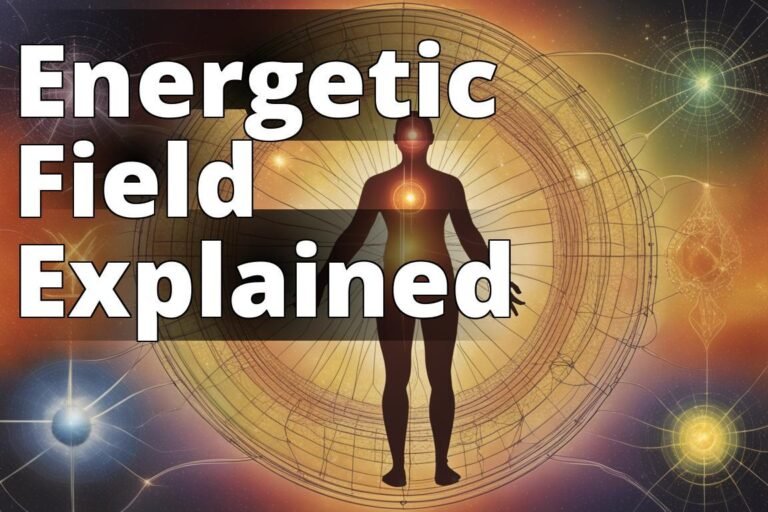The Science Behind the Power of Thought
Have you ever wondered how our thoughts influence our lives? The power of thought is a universal law that can be harnessed for good. By controlling our thoughts, we can improve our health, relationships, and lives. This article will delve into the intricate web of how our body is impacted by our thoughts and the compelling physics of the supernatural that ties it all together.
Impact of Thoughts on Us
Discover how thoughts influence our physical, mental, and spiritual well-being.
– Thoughts can affect our body by triggering physiological responses, impacting overall health and energy levels.
– Positive thinking enhances mental clarity and emotional resilience, contributing to better relationships and life satisfaction.
– Practicing mindfulness and gratitude can help harness the power of thought, leading to a more fulfilling present and future.
The Science Behind the Power of Thought
The power of thought isn’t just a metaphysical concept but a scientifically backed phenomenon. Neuroscience has shown that our thoughts can influence our brain chemistry, which in turn affects our physical health. The brain is a complex organ with about 86 billion neurons, and the way these neurons fire can influence our mood, perception, and even our physical state.
Research from the field of psychoneuroimmunology reveals that negative thinking can weaken the immune system, while positive thinking can bolster it. This isn’t just about feeling good; it’s about the tangible impact on your body’s ability to fight off illness. For example, a study published in the Journal of Behavioral Medicine found that individuals with a positive outlook had a 14% greater chance of living longer than their pessimistic counterparts.

Insider Tip: Dr. David Hamilton, author of “How Your Mind Can Heal Your Body,” suggests practicing visualization techniques for at least ten minutes a day to improve your immune response.
Explore more about the science behind thoughts here.
The Power of Thought and the Body
The connection between our thoughts and physical health is palpable. Consider this: when you’re stressed or anxious, your body reacts. Your heart rate increases, your muscles tense, and your stomach might churn. This is because your thoughts trigger a physiological response, often referred to as the fight-or-flight response.
Chronic negative thinking can lead to physical ailments such as hypertension, chronic pain, or even heart disease. Conversely, positive thoughts can have a healing effect. Studies have shown that patients who maintain a hopeful outlook during recovery often experience faster healing and less pain.

Insider Tip: Engage in regular physical activity like yoga or tai chi, which not only improves physical health but also promotes a positive mental state.
The Power of Thought and the Mind
The mind is a powerful tool, and our thoughts are its primary currency. Cognitive Behavioral Therapy (CBT) is a prime example of how changing thought patterns can alter behavior and emotional states. This therapeutic approach helps individuals reframe negative thinking, showing the profound impact of thoughts on mental health.
The placebo effect is another striking example. When patients believe a treatment will work, they often experience real improvements, even if the treatment is inert. This is the mind’s power at work, demonstrating that belief itself can trigger real, positive changes.

Insider Tip: Journaling can be an effective way to track and modify your thought patterns. Spend a few minutes each day writing down your thoughts and reflecting on their impact.
The Power of Thought and the Spirit
The power of thought extends beyond the physical and mental realms into the spiritual. Thoughts can be a gateway to spiritual awakening and enlightenment. Many spiritual practices, such as meditation and mindfulness, emphasize the importance of controlling thoughts to achieve higher states of consciousness.
In many traditions, thoughts are believed to be the seeds of karma. What you think can influence the energy you put out into the world, shaping your spiritual path. Positive thoughts can align you with positive energies, while negative thoughts can attract negativity.

Insider Tip: Start each day with a positive affirmation to set the tone for your spiritual journey.
The Power of Thought and Relationships
Our thoughts shape how we interact with others. They influence our perceptions, beliefs, and behaviors, which in turn affect our relationships. Negative thoughts can poison relationships, leading to misunderstandings and conflicts. In contrast, positive thoughts foster empathy, understanding, and love.
Consider how assumptions and judgments can cloud your interactions. If you think someone is unfriendly, you may act coldly, thus perpetuating a negative cycle. However, if you approach others with an open and positive mindset, you’re more likely to build strong, meaningful connections.

Insider Tip: Practice active listening in conversations. Focus on understanding the other person’s perspective to foster better communication and relationships.
The Power of Thought and the Future
Thoughts are not just reflections of the present but also blueprints for the future. The Law of Attraction suggests that what we focus on expands. If you consistently think about success, you’re more likely to achieve it. Your thoughts guide your actions, and your actions shape your destiny.
This isn’t just wishful thinking. Setting clear, positive intentions can lead to goal-oriented behaviors, enhancing your chances of success. Visualization techniques, often used by athletes, are a testament to the power of thought in predicting future outcomes.

Insider Tip: Create a vision board with images and words representing your goals. Place it somewhere you’ll see daily to keep your aspirations front and center.
The Power of Thought and the Present
While thoughts can shape the future, they are most powerful in the present moment. Mindfulness teaches us to focus on the now, where life truly unfolds. By being present, we can fully experience life, free from the burdens of past regrets or future anxieties.
Mindfulness practices, such as deep breathing or body scans, can help anchor you in the present. These techniques allow you to observe your thoughts without judgment, promoting a state of calm and clarity.

Insider Tip: Try the 5-4-3-2-1 grounding exercise: identify five things you can see, four things you can touch, three sounds you can hear, two things you can smell, and one thing you can taste.
The Power of Thought and God
In many religious traditions, thoughts are seen as a form of prayer, a way to communicate with the divine. Whether you believe in God, a higher power, or the universe, your thoughts can be a conduit for spiritual connection and divine guidance.
Prayer, meditation, and contemplation are practices that harness the power of thought to deepen one’s relationship with the divine. These practices encourage believers to focus their thoughts on gratitude, love, and compassion, aligning their will with a higher purpose.

Insider Tip: Dedicate a few moments each day to silent prayer or meditation, focusing on your intentions and desires.
How to Harness the Power of Thought
Harnessing the power of thought requires awareness, intention, and practice. Here are some practical steps to help you master your thoughts and, by extension, your life:
1. Be aware of your thoughts.
Awareness is the first step to change. Notice your thought patterns and how they affect your emotions and actions. Mindfulness meditation can help increase this awareness.
2. Choose your thoughts.
You have the power to choose what you focus on. When you notice negative thoughts, challenge them and replace them with positive alternatives.
3. Change your thoughts.
Reframe negative situations to find the silver lining. This doesn’t mean ignoring reality but rather choosing to focus on what you can learn and how you can grow.
4. Focus on the present.
The present is where life happens. Practice mindfulness to fully engage with the current moment, reducing stress and increasing joy.
5. Be grateful.
Gratitude shifts your focus from what you lack to what you have, fostering a positive mindset. Keep a gratitude journal to cultivate this habit.
6. Pray.
Engage in prayer or meditation to align your thoughts with your spiritual beliefs. This practice can provide peace, clarity, and guidance.

Conclusion
The power of thought is both profound and transformative. It influences our bodies, minds, spirits, relationships, and even our future. By cultivating positive thoughts, we can harness this power to improve every aspect of our lives. It begins with awareness and grows through practice, guiding us toward a fulfilling, empowered existence.
As you navigate your day, remember that your thoughts are the seeds of your reality. Plant them wisely, nurture them with care, and watch as they blossom into the life you desire.
For further exploration of how your thoughts can shape your reality, visit Thin White Lies.
Q & A
Question: How do thoughts influence our physical body?
Answer: Thoughts can trigger physiological changes, affecting health and emotions.
Question: What is the connection between thoughts and bodily functions?
Answer: The mind-body connection shows that thoughts can alter bodily responses.
Question: Who studied the link between thoughts and physical health?
Answer: Many researchers, including psychologists and neuroscientists, have studied this.
Question: How can positive thinking affect our health?
Answer: Positive thinking can reduce stress, boost immunity, and enhance well-being.
Question: Are negative thoughts harmful to our physical health?
Answer: Yes, negative thoughts can lead to stress and may weaken immune function.
Question: What if I find it hard to change my thoughts?
Answer: Practicing mindfulness and seeking support can help shift your mindset.







